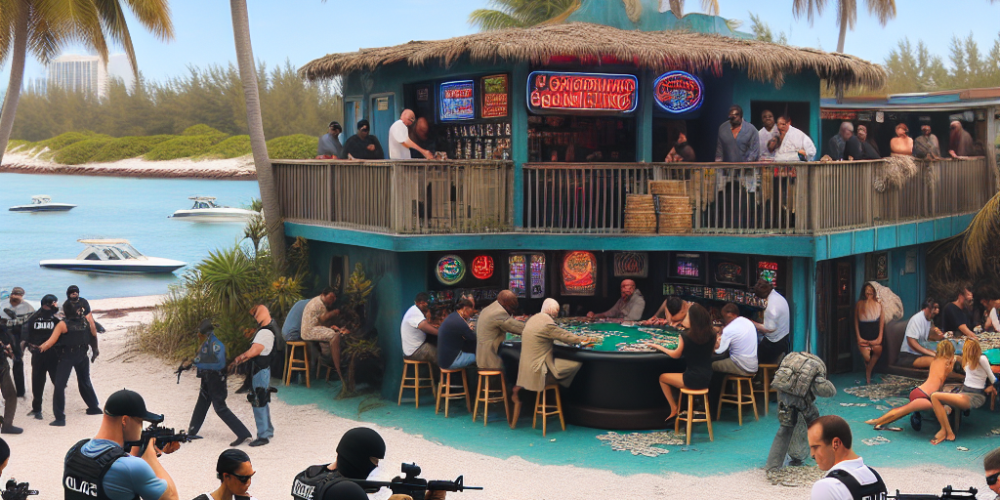The Polk County Sheriff’s Office successfully arrested 28 individuals in an undercover operation on September 3, 2025, marking a significant effort by Florida to curb unauthorized gambling. This operation, labeled “Operation Bad Odds,” targeted illegal gambling activities that have proliferated across land-based venues in the state.
During the operation, authorities seized 48 illegal gambling machines and over $100,000 in cash. The state Gaming Control Commission, working alongside the Auburndale Police Department, meticulously coordinated the crackdown to identify and dismantle the operations. The investigation revealed that instead of concentrating on a single location, the illegal activities were spread across 11 different venues, each functioning as a facade for gambling operations. The police, armed with search warrants, managed to track and raid all these locations, leading to the arrests.
Sheriff Grady Judd was forthright about the repercussions awaiting those involved in illegal gambling activities. He stressed that individuals participating in such operations should expect to face jail time. Judd issued a stern warning to the public, advising them to avoid these illegal gambling sites. He pointed out that the confiscated machines were rigged against players, ensuring that gamblers were being defrauded. “People who gamble on machines like the ones we confiscated are being ripped off,” Judd remarked, emphasizing the deceptive nature of the operations.
The arrested individuals are facing a variety of charges including maintaining a gambling house, possession of slot machines, and lottery-related offenses. The Polk County Sheriff’s Office has released mugshots of all the individuals involved, underscoring their commitment to transparency and public safety.
The crackdown is part of a broader initiative to enforce gambling regulations more strictly across Florida. Illegal gambling has long been a concern for authorities, not only because it evades state taxation and regulatory oversight but also due to its potential links to other criminal activities. By strengthening enforcement, Florida aims to protect its residents from the risks associated with unregulated gambling.
However, the issue of illegal gambling is not straightforward. Critics argue that the demand for these venues stems from a lack of legal gambling options readily available to the public. As some experts suggest, the persistent demand for gambling activities in Florida indicates a potential area for legal expansion, which could be more effectively regulated and taxed. Legalizing more forms of gambling, they argue, could reduce illegal operations by offering a safer and more transparent option for those interested in gambling.
This perspective highlights the ongoing debate between strict regulation and expansion of gambling laws. While some see tighter enforcement as essential to curb illegal activities, others believe that expanding legal gambling options could be a more effective long-term solution to reduce the allure of illegal venues.
Moreover, this operation and its outcomes come at a time when gambling regulations are under increased scrutiny across the United States. With the rise of online gambling platforms and sports betting, states are reassessing their regulatory frameworks to adapt to the evolving landscape. In this context, Florida’s actions serve as a reminder of the complexities involved in balancing regulation with market demand.
In addition to the legal aspects, there are social implications to consider. The allure of gambling, particularly in communities with limited recreational options, can have profound effects. It is often in these underserved areas that illegal gambling operations flourish, capitalizing on the lack of alternative entertainment opportunities. Addressing these underlying social issues may be as crucial as law enforcement efforts in curbing illegal gambling.
As the state continues its efforts, the collaboration between law enforcement agencies and the Gaming Control Commission will likely play a vital role in future operations. The success of this recent sting operation may encourage similar coordinated efforts in other jurisdictions, setting a precedent for tackling illegal gambling more aggressively.
Ultimately, while the crackdown on illegal gambling is a victory for law enforcement, it also serves as a catalyst for broader discussions about gambling regulation, public safety, and economic opportunity. The challenge remains in finding the right balance between control and access, ensuring that any expansion of gambling options is accompanied by robust regulatory measures to protect consumers and the integrity of the industry. As this dialogue continues, Florida’s latest actions highlight the immediate need for comprehensive strategies to address both the symptoms and roots of illegal gambling activities.

















